MCCQE1 Exam Passing Secrets!

- MCCQE1 Exam: What You Need to Know?
- What Is Qbank?
- Why Use A Question Bank For MCCQE1?
- How can a Qbank help with MCCQE1 preparation?
- The Benefits Of Studying With A Question Bank
- Which Qbank Is Best For MCCQE1?
- What Does Ace QBank Offer For MCCQE1 Exam Preparation?
- MCCQE1 Preparation Course
- Books For MCCQE1 Exam Preparation
- Proven Tips & Strategies For Acing The MCCQE1 Exam
- Key Takeaways
All Canadian medical students and International Medical Graduates (IMGs) must take the Medical Council of Canada Qualifying Examination (MCCQE) Part I to attain certification as medical professionals.
However, success on the exam cannot be guaranteed and studying for the exam can be an intimidating and overwhelming task. It requires extensive preparation, knowledge of relevant medical concepts, clinical skills, and an effective test-taking strategy, especially when it comes to time management. Knowing where to start and how to properly cover the Medical Council of Canada (MCC) objectives can add to the anxiety.
But what if there was an easy way to prepare for the MCCQE Part I? A Canadian question bank designed with the MCC objectives in mind, incorporating evidence-based medicine, and regularly updated, could help you maximize your preparation and improve your chances of passing the MCCQE1 exam.
If you have it in your schedule to study for the Canadian qualification exams and sit for the MCCQE1 in the near future, this article is perfect for you. In this post, we’ll discuss the advantages and disadvantages of using a question bank, as well as how using a question bank can help you cover the objectives more effectively. We will also review the best Qbank available for MCCQE1 exam preparation. In the end, I will provide you with a few tips and briefly go through the MCCQE1 exam preparation courses as well as traditional study methods.
MCCQE1 Exam: What You Need to Know?
As a medical graduate preparing for the MCCQE1 exam, it is important to put together an effective preparation strategy that will help you ace the exam. While there are three approaches that candidates often use in combination – Qbank, textbooks and MCCQE1 preparation course – using the question bank is the most effective way to achieve success and save your precious time.
Here is why a question bank is your best friend when it comes to MCCQE1 exam preparation. Qbank offers a wide range of questions with varying difficulty levels so that you can practice and become familiar with the exam format. Apart from this, it also helps you develop test-taking strategies, enhance your time management, track your progress and identify the areas that need more attention.
Using a Qbank will help you become more familiar with the format of the exam and the different types of questions by answering questions in the same format as the actual exam, as well as encouraging problem-solving skills across a wide range of topics and critical thinking.
On the other hand, it supports you by providing you with in-depth explanations that will assist you in better comprehending the concepts.

However, Choosing the correct Qbank is critical when preparing for the MCCQE Part 1 exam. A Qbank that has thoroughly covered the MCC objectives and offers a comprehensive comprehension of the objectives can be a huge win for any test-taker. Not only does it make the process of studying for the exam easier, but it also gives you the confidence that you are adequately prepared for the exam.
Textbooks, along with the Qbank, can be used to provide in-depth coverage of complex medical concepts. But textbooks alone cannot provide complete coverage of the MCC objectives, as they offer a good overview of many topics that may not be relevant or advanced. That’s why candidates should use textbooks in combination with the Qbank to support active learning, which is the key to long-term memory formation and success in board exams.
The MCCQE1 exam preparation course is not necessary, but some candidates may feel more comfortable with a short course that rapidly reviews the high-yield medical concepts for the exam. However, if you’re looking to save time and money, then going with the Qbank and textbook combination is the best option.
What Is Qbank?
The question bank is an invaluable resource for board exam preparation. It helps to reinforce active learning by providing a comprehensive collection of practice questions and answers that can be used to test the knowledge acquired in the course of studies. This allows students to focus on areas where they need the most improvement while also gaining familiarity with the type of questions they can expect on the upcoming exam.
The question bank is perhaps one of the most efficient methods to study for any exam since it gives a thorough overview of all objectives covered in the exam. In addition, it helps to create an environment where students can become more comfortable with taking exams and answering questions accurately and efficiently.
However, when it comes to MCCQE Part 1, Qbank or question bank is a powerful tool in the toolbox for medical graduates or students preparing for the exam. It provides a comprehensive pool of questions with explanations to help them practice and properly prepare for the qualification exam.

The Qbank has been around for a long time, and it is well-known throughout the world as the most effective way to study for an exam, giving students a crucial edge when it comes to performing their best on exam day. Applicants are encouraged to actively learn and apply their knowledge when responding to questions, fostering their learning and enhancing their conceptual understanding.
Qbank offers an opportunity to improve your medical proficiency, refine test-taking abilities, strengthen time management, and boost your confidence for the board exam. It is a comprehensive platform designed to provide users with an expansive library of practice questions and detailed explanations for each answer.
Nevertheless, a Qbank is not only about the questions and answers; there are also distinctive features that are game changers and are usually included in an elite question bank, where quality is of the utmost significance.
These unique features are intended to give users an advantage over their peers by focusing on things that can significantly enhance memory retention and boost performance. These features are not simply high-resolution images but a combination of crafted quality with passion.
Features such as summary tables, flow charts and custom illustrations. Summary tables provide an overview of essential information, whereas flow charts help simplify sophisticated medical concepts and facilitate understanding rather than memorization and custom illustrations help improve retention, as they are designed to be remembered easily. These are the golden keys to success on exams.
Another feature often seen in elite question banks is the summary points. These summary points provide a quick overview of the main concepts and highlight the key points, allowing the user to skip through the entire explanation and get to the point fast. This allows the user to swiftly evaluate the content and go to the next question.
Choosing the right question bank is critical when studying for a high-stakes exam. Various options are available, but it is essential to conduct extensive research and weigh both the advantages and disadvantages of potential Qbanks. Make sure to look into the available options and consider the features, the topics covered, and the quality of the explanations provided. After weighing the pros and cons, you can narrow down your choices to find the perfect Qbank for success in your exam.
It is indeed lucky for those taking the MCCQE Part 1 exam since there is only one high-quality Canadian question bank. Later, I will tell you which Qbank is the best for the exam and provide you with all the details about the features it offers. I will also share the benefits of using a Qbank to prepare for the MCCQE1 exam.

Why Use A Question Bank For MCCQE1?
Reading textbooks from cover to cover and underlining every line on every page in a different colour is an outdated and inefficient way of learning for the board exam. Instead, it’s important to focus on the key concepts, understand the objective thoroughly and then apply that knowledge in practical situations. Textbooks should be used as an aid to gain a fundamental understanding of a subject and clarify medical concepts; they should not be used as the primary source for board exam preparation.
However, the experience of taking a comprehensive qualification exam can be nerve-wracking for some candidates; to alleviate this burden, they will switch to passive learning (using several textbooks) to study for the exam. However, it is essential to recognize the possible risks associated with this approach, as it can be deceptive and often results in failure.
Reading textbooks is a passive way of learning and can limit the understanding and application of knowledge. By contrast, Active Learning techniques such as doing questions from Qbank allow you to gain a deeper understanding of the objective you are studying. It also encourages critical thinking and problem-solving, which can help you to retain information better.
Active engagement with the material is the key to successful retention and recall. It doesn’t matter what the material is – a foreign language, a music concept, or the MCC objective – active engagement is essential for successful learning. Engaging actively with the material helps to improve retention and shorten the recall time.
When you actively use the material, you are more likely to remember it and be able to recall it quickly. It’s important to find ways to actively engage with the material, such as studying with a partner, taking notes, or doing practice exercises. Doing these activities will help you to better understand and remember the material and will help you to recall it more quickly.
Question banks provide a platform for interacting with information in an engaging way, which is essential for effective memory formation and is the best way to ensure successful retention and recall of the material. This means that instead of simply memorizing facts, it will challenge your brain to think critically about the learned material to recall and use it to solve the presented problem. This type of engagement will help your brain to better retain the information.
On the other hand, regularly recalling the information will help strengthen your memory and ensure the information is retained. Meaning doing questions daily from a question bank not only helps with the faster recall of learned knowledge but also strengthens the memory, resulting in outstanding time management and a higher chance of success in the MCCQE1 exam.
Let’s think about the MCCQE Part 1 for a moment here; The list of objectives that need to be mastered for success in the exam is extensive. With a focus on understanding and accurately applying the knowledge, you must put in long hours of hard work to prepare for this rigorous examination.
But with a comprehensive question bank, you can save time and energy while studying for the exam. By challenging you on the MCC objectives, it will help you build a better knowledge of medical concepts, establish long-term memories, and enhance and sharpen memory. This improves your exam performance by providing comprehensive questions and detailed explanations, which can be a crucial difference-maker on exam day.
This process can be enhanced further by using strategies like spaced repetition and mnemonics to make memories more accessible. This, in turn, increases the chance of faster retrieval in the future.
The other point worth mentioning here is that the MCCQE1 exam is a high-stakes and challenging exam that requires more than mere memorization. You can’t simply memorize facts for the exam and expect to do well. It is essential to comprehend and implement the material cohesively. This increases your chances of answering questions correctly on the test. It’s vital to comprehensively understand the content before taking this exam.
When it comes to the MCCQE Part 1, Mere Memorization Is Not Your Friend.
A question bank that boosts one’s engagement and understanding of the medical concepts and improves one’s ability to remember information as well as helps decrease the amount of time spent on each question in order to improve one’s ability to manage the time better for the exam is definitely worth considering since it is offering three elements that, when combined, constitute a combination that can change the game entirely.
Your purchase of any Qbank that offers this combination is your ticket to success, as it gives you all the resources you need to ace your exams. With such a powerful tool at your fingertips, you can be sure that all your hard work will be rewarded with flying colours!

How can a Qbank help with MCCQE1 preparation?
Many candidates who wish to maximize their chances of success on the exam utilize a question bank for studying and practicing.
A Qbank can be a valuable tool for MCCQE1 preparation. It allows you to focus on areas where you may need additional review and understanding of MCC objectives. Working on a test-taking strategy and improving time management are important components of the Qbank that can help with MCCQE1 preparation.
The Qbank includes practice questions so that you can get familiar with the sorts of questions that will appear on the exam and get a sense of the difficulty level. With the feedback from each answer, you can also track your progress and identify which areas require more attention. It can also help you develop the ability to interpret data and make decisions based on evidence to increase your chances of success on the exam.
However, to ensure that you are well-prepared for the MCCQE1 exam, a quality question bank is necessary to adequately prepare for the exam and increase your likelihood of success. Such a Qbank should contain all of the features listed below, or at least the majority of them. The essential components of preparation are:
- Time management is a key factor for success because the exam includes multiple-choice questions (MCQ) that must be answered in a certain amount of time.
- The MCC objectives: allocating adequate time to review and understand the MCC objectives is critical, as all MCQ and CDM cases are created based on the objectives.
- Filling the gap: doing practice questions is a great way to identify knowledge gaps. These gaps might not be evident and well disguised, but they can significantly impact your exam performance.
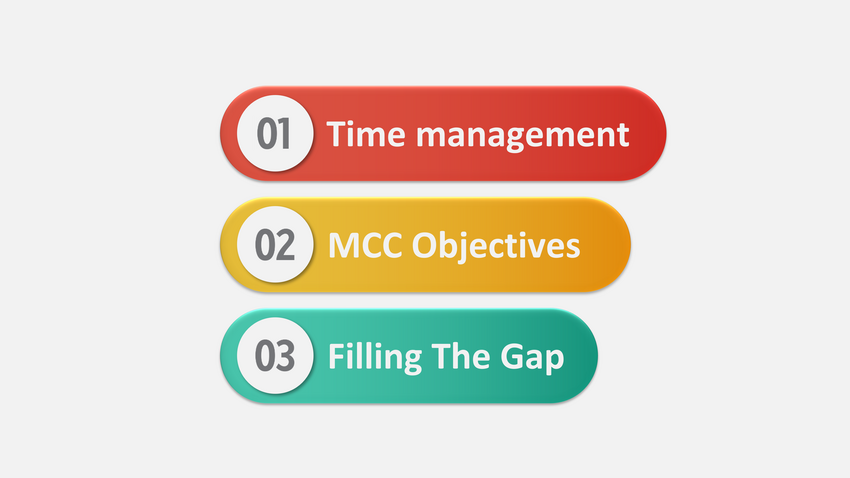
TIME MANAGEMENT
The exam consists of two parts, and both are timed. Time management is an essential element for success in the MCCQE1 exam. However, it’s not always easy to properly manage your time as several factors influence time management.
Time management is a critical skill for anyone planning to take the MCCQE1 exam, which is influenced by multiple factors. The best part is that most of these factors are modifiable; you can adjust them to maximize your time management.
This requires conscious effort, though; it is essential that we identify the factors influencing your time management and take steps to optimize them to your advantage and enhance your time management.
However, this statement raises a few valid questions, such as:
- What are those factors?
- Which one of the factors to optimize?
These factors are unique to each individual and may include the speed at which they answer questions or their lack of knowledge of the objectives. Practicing with a Qbank makes it possible to identify and improve these factors to boost your performance on exam day. It is therefore recommended to recognize and improve these factors before the exam. Let’s explore these factors to have a better understanding of them and how to optimize them.
Modifiable factor in Time management:
The modifiable factor for Time management falls into two major categories minor and major.
The minor modifiable factors are specific to each individual and can range from something as simple as not getting enough sleep the night before, to something as unpredictable as having a flat tire on the highway on the way to the exam.
While these factors can have an impact on your performance, they don’t have to be a major cause for concern. With some planning and preparation, you can prevent these minor factors from happening. And if something unexpected does happen, you can always take a deep breath and try to stay calm – it’s the best way to ensure that you can do your best on the exam.
On the other hand, major modifiable factors directly influence exam performance. Major modifiable factors are also specific to each individual, but in contrast to minor modifiable factors, if ignored or remain unidentified, will result in serial failure in the exam.
For instance, let’s assume someone created a question block with 40 questions from Obstetrics and Gynecology in the time mode.
When the allotted time has passed, and the number of unanswered questions equals or exceeds a quarter of the total number of questions in the question block, multiple factors are involved here. We can conclude that proper time management is not the only problem at hand here. There is a good chance that the speed of reading and the depth of comprehension of the Obstetrics and Gynecology objectives were also other contributory factors.
So, these three major modifiable factors must be addressed before the exam day; otherwise, the same thing will happen again.
At this point, It is essential to take the time to go back and review each question you answered incorrectly. Taking the time to understand why you answered a question wrong is the only way to ensure that you don’t repeat the same mistake.
Having patience and perseverance in going through each question to find the cause of the incorrect answer is the only way to prevent this from happening again. Doing this will help you to understand the material better and give you the confidence to answer the questions correctly the next time.
Making sure you comprehend the material and avoid repeating mistakes may take some time, but it is worthwhile.

Many people wrongly assume that time management and objective comprehension are directly proportionate. There is a theory that a better understanding of the MCC objectives will result in more time spent on questions because the candidate will spend more time reading the entire question stem, going through clinical manifestation, history, and physical examination finding to find all the clinical clues, connect the points, and select the correct answer. However, this is not necessarily true.
In fact, time management and understanding the objectives are often inversely proportional; the better one understands the objectives, the less time one will spend on questions and the more efficient their time management will be. This is because understanding the objectives allows one to answer the questions quicker as they process the question stem of the question and eliminate the wrong options below the allotted time with confidence.
It goes without saying that having access to a question bank filled with high-yield questions and reliable resources is one of the biggest factors contributing to user success. The questions will allow users to practice their problem-solving and critical thinking, improving their ability to answer any question they may encounter.
On the other hand, the Time mode features of Qbank will give users the opportunity to manage their time better, allowing them to work quickly and efficiently. With the help of a question bank, users can learn to become more proficient in both Knowledge and time management, giving them the edge they need to do well in any task they come across and a better chance of succeeding in their MCCQE Part 1.
The quality of the questions is essential and matters the most, as is the range of topics covered. A question bank should have questions on a variety of topics so that users can see how different concepts are connected. It’s also important that the questions are updated regularly with new questions so that users can keep up with the latest changes in the exam.
FILLING THE GAP
Another important aspect of an online question bank for qualification exams is that it provides a virtual platform where physicians can actively engage with questions or clinical cases from anywhere in the world. This is presented in an interactive format that encourages active learning, allowing physicians to quickly and effectively apply their knowledge and hone their test-taking skills to better prepare for the qualification exam.
As a physician, one cannot provide the correct answer to a question without a thorough knowledge of the medical concepts being asked. While this can be challenging, it is one of the most rewarding aspects of using a Qbank.
The medical knowledge mentioned here refers to the abstract of years of studying clinical manifestations, looking at clinical images, and reading articles to create a meaningful connection between all to ensure robust recall of essential information instead of looking up the information.
Learning and retaining all of the important information calls for a significant investment of time, effort, and commitment. It is not enough to merely seek up the information when it is required; in order to make the best clinical decisions for their patients, medical professionals need to have a strong recall of the knowledge.
This means abstracting years of studying clinical manifestations, looking at clinical images, and reviewing understood medical concepts to create a meaningful connection between them all. This process can be difficult and time-consuming, but it is essential for providing the best care for patients.
Having the ability to recall relevant information quickly and accurately is an essential skill for any medical practitioner. With this knowledge, physicians can ask the right questions during the patient’s history taking, come up with a differential diagnosis, and order further studies (lab or imaging) to rule out the less likely diagnosis. This information can then be used to manage and consult the patient in a timely manner and provide the best possible care.
Physicians use a question bank to assess their firm understanding of a variety of topics since a great way to guarantee that they have an in-depth comprehension of the medical field in which they practice.
Every wrong answer is an indicator of a missing piece of information, and the question banks often have explanation and reference sections to help physicians identify and fill in the missing pieces. The explanation section provides more information about the missing pieces, while the reference section provides a guide on where to read more about that particular missing piece of information.
Preparing for the MCCQE1 exam is an important part of a medical graduate’s journey to getting medical licensure. Many medical graduates use a question bank to assess their understanding of the MCC objectives. This is a great way to identify missing pieces of knowledge, or “knowledge gaps,” that may exist in their understanding of the material and may be preventing them from achieving success in the exam.
Once these gaps are identified, it is important to take the time to read up on the topics that are missing from the graduate’s knowledge base in order to fill in the missing pieces. This extra effort can go a long way in increasing the likelihood of success in the exam.

The whole point of the computerized standard qualification exam is to fish for the candidates with wide knowledge gaps because those who are enthusiastic are curious to know and study to learn more; thus, they will be more knowledgeable and capable of passing the qualification exam.
On the flip side, the purpose of a question bank for the qualification exam is to encourage candidates to engage in critical thinking, problem-solving, and the process of challenging themselves to identify knowledge gaps by doing questions, as well as to provide applicants with detailed explanations, summary tables, flowcharts, and colourful illustrations to assist them in comprehending medical concepts and filling knowledge gaps.
This approach will help candidates studying for the qualifying exam identify any misunderstood medical concepts or a lack of understanding regarding certain medical concepts. However, from that point on, improving before taking the exam is entirely up to the candidate.
To the question, “How can a Qbank help with MCCQE1 preparation?”
A quality Qbank can be a beneficial tool for MCCQE1 preparation. You will gain a more comprehensive understanding of the MCC objectives by taking advantage of in-depth explanations, summary tables, flow charts, and colourful illustrations. Not only that, using one can improve your time management skill by allowing you to practice in time mode.
Going through questions is not just a great way to test your medical knowledge, advance your understanding and build on your skills but also a great way to uncover knowledge gaps that may be well hidden. It provides valuable guidance that can help you determine which areas to focus on more, with explanations to help you improve them.
The best thing about using QBank is that it helps you learn more, which makes you better prepared for when the same medical concepts come up again in the future.
The Benefits Of Studying With A Question Bank
Studying for the MCCQE Part 1 with a question bank could really help you get where you want to be! Not only will you get a handle on what’s expected of you for the exam, but you will also get more comfortable with the format and the content.
Revealing The Knowledge Gap:
It is no secret that physicians have knowledge gaps that can occur over time. The fact is that no matter how experienced or knowledgeable a physician is, there will always be some gaps in their knowledge as medicine evolves and is ever-changing.
However, it is worth noting that these gaps can be difficult to detect without actively seeking them out. Doing questions is a terrific approach to expose any knowledge gaps that may have been disguised and will enable you as a physician to constantly remain up to date with the latest developments in the field.
The primary benefit of studying with a Qbank is that it will reveal the knowledge gap you may have by allowing you to actively engage with questions. By answering questions, you can brush up on topics essential to understanding the objectives and increase your chance of performing well on the MCCQE1 exam.
On the other hand, the interesting fact about these gaps is that the more you do questions and review the materials, the narrower this gap becomes, and the sharper becomes your problem-solving and critical thinking as a physician.
Saving Time:
A question bank is an invaluable tool for applicants preparing for the exam. It has the potential to save them a lot of time and assist them in determining where their knowledge is lacking. By using a question bank, applicants can easily fill in these gaps and better understand the objectives. This is especially useful for those who are short on time or who have limited access to resources.
In addition, a Qbank that gives users access to the most recent and reliable content available, along with mentions of references for content and the corresponding MCC objectives that go with it, will help applicants who are studying for the exam save a significant amount of time and improve their chances of passing the exam.
By having access to the most up-to-date and accurate information, applicants can focus their time and energy on the areas they need to work on. Furthermore, clearly mentioning the MCC objectives can help them track their progress, ensure all topics are covered, and that applicants are fully prepared for the exam.
Better Time Management:
Creating a question block while the study mode is set to time gives you the opportunity to practice test-taking strategies and improve your ability to manage your time effectively.
One of the strategies you will develop is not to spend an unreasonable amount of time on any question, and if the question seems to be too difficult or time-consuming to answer, it is best to flag it and move on to the other questions.
Time management is vital because staying within the time limit that has been provided will ensure that all of the questions are answered, and answering all questions quickly and effectively is what helps you pass the exam with a high score.
You will have a substantial edge on the exam if you can master test-taking strategy and time management, as they are equally as important as the MCC objectives that you need to cover.
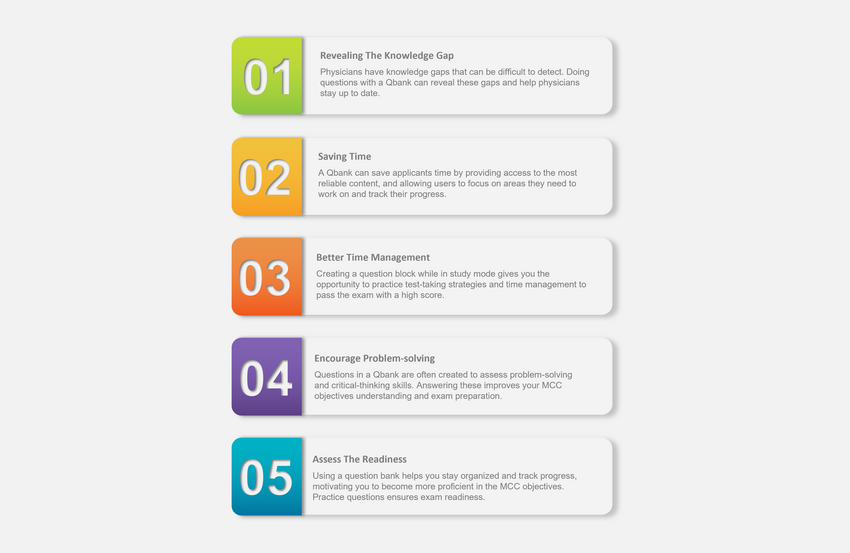
Encourage problem-solving:
Questions in a question bank are often created with the intention of assessing an applicant’s problem-solving and critical-thinking abilities. These questions are designed to help applicants apply the knowledge they have acquired to a particular situation.
By thinking through and answering questions, you can gain a deeper understanding of the MCC objectives and learn to apply the knowledge you have learned. So if you want to get the most out of your study sessions, be sure to give yourself enough time to think through the questions you encounter in Qbank. It will help you to become more confident in your abilities and better prepared for the exam.
Questions may include scenarios that must be analyzed and solved, as well as diagnostic criteria or management steps related to the MCC objective to remember. This provides insight and allows candidates to better prepare for the MCCQE Part 1 by gaining an understanding of knowledge and skills to make appropriate improvements.
Assess your readiness:
Using a question bank helps you stay organized and on provides an overview of the extra materials you need to learn or review. It also allows you to easily track your progress throughout the course preparation, which helps you stay motivated and push yourself to become more proficient in the MCC objectives.
By consistently practicing questions, you can ensure that you are always learning and improving and preparing yourself for any challenges that may arise on exam day.
However, there is always the question of whether or not one is really prepared for the exam, which causes the question of “Am I ready for the exam?” to spin in one’s mind constantly.
Taking the MCCQE1 self-assessment is the one and only way to find out, which will allow you to determine whether or not any objectives have not been addressed and require your immediate attention. You will have a much improved probability of succeeding on the exam if you take advantage of the opportunity that the self-assessment provides you, which is to improve upon your areas of weakness before you take the test.

Which Qbank Is Best For MCCQE1?
The MCCQE1 exam is the most challenging board exam in North America. It is a comprehensive exam that assesses the medical knowledge, clinical skills, and communication of medical graduates to ensure that they are competent to practice medicine in Canada.
The qualification exam is administered by the Medical Council of Canada and is a requirement for medical licensure in Canada. The exam is composed of multiple-choice questions and clinical scenarios designed based on the Medical Council of Canada’s Objectives. It is a difficult exam to pass and requires great preparation and dedication.
Ensuring a successful outcome on the exam requires preparation utilizing reliable and up-to-date Canadian resources. A question bank is an effective means of achieving success on the exam, and there is only one comprehensive Canadian Qbank available to facilitate this goal. This comprehensive Qbank provides reliable material that will assist you with reaching success.
Maximizing your success on the MCCQE1 exam is easy when you use Ace QBank! As Canada’s number-one question bank, it offers three amazing products and top-notch features to help you get the best results. Discover why Ace QBank is so special and see what it can do for you!
Ace QBank Products:
Ace QBank is a comprehensive suite of products designed to maximize medical graduates’ performance when preparing for examinations. Ace QBank products include Qbank, Clinical Decision Making (CDM) Cases, and Self-assessments. All three components are key in aiding a successful exam preparation process. Here’s an overview of what each product entails:
MCCQE Part 1 Question bank
With over 2400 high-yield questions designed based on the MCC objectives, Ace Question Bank will properly cover the first part of the MCCQE1 exam. You can practice questions in two study modes: time and tutor mode.
It is best to use timed mode for subjects you already know well and to try to get better at managing your time while answering questions in a timed setting. However, after you’ve finished creating your question block, make sure to go over the feedback you received to see how much time you spent on each question.
On the other hand, you can use the tutor mode on disciplines you are unfamiliar with to hone your comprehension skills by reading the explanation thoroughly and ensuring you understand the reason for the incorrect answer, paying attention to the presentation, and determining the key clinical facts about the clinical presentation.
Clinical Decision Making (CDM) cases
140 top-notch clinical cases are also designed based on the MCC objective and will help prepare you for the second part of the exam. Clinical cases are designed to simulate the CDM part of the exam and contain thorough explanations.
The best approach for making the most of the clinical cases and getting ready for the CDM part of the MCCQE1 exam is to finish the CDM cases after finishing the question bank. Because of the similarity of clinical presentation and clinical clues associated with those presentations, the question bank includes summary tables and flow charts to help with management steps to help with retention on exam day.
Self-assessment
Ace Qbank is the only question bank in Canada that offers self-assessments for the exam. Anyone would be keen to check how efficient their preparation is before appearing for the actual exam after months of study.
The best thing about the MCCQE1 self-assessments is that the 120 hand-picked questions are truly challenging, hand-picked by the expert, and different from what you’ve seen and studied in the question bank to effectively measure your preparation for the MCCQE Part I exam.
Ace Qbank self-assessments are true exam simulations designed to make you feel like you’re taking a real exam.
Sign up for the Ace Qbank demo now to experience the difference.
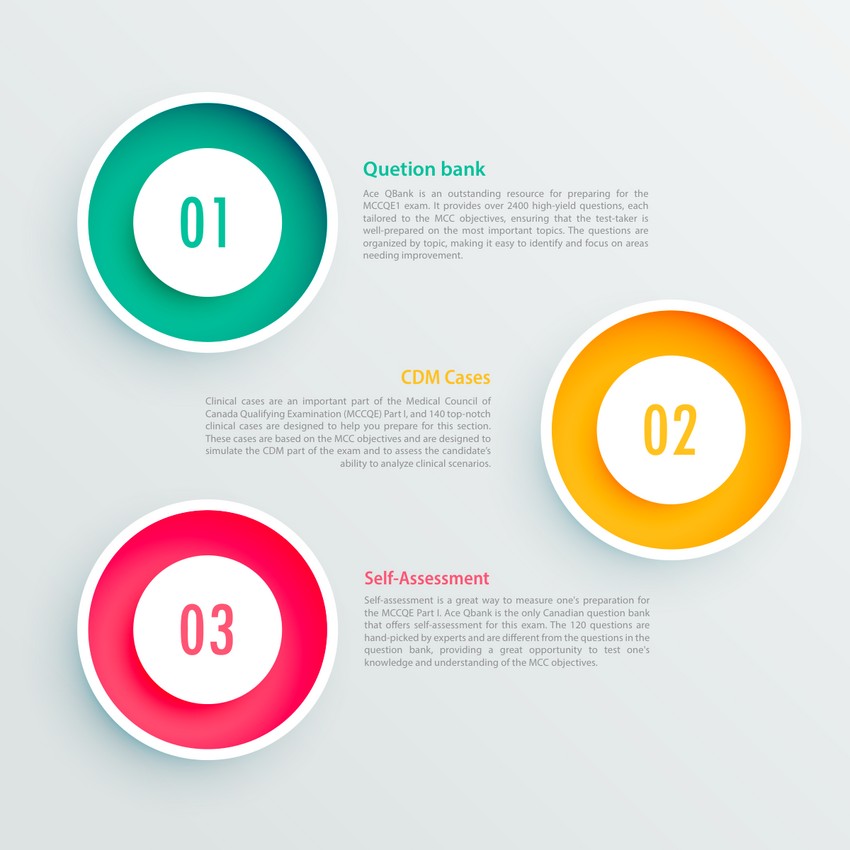
Ace QBank Features:
Ace QBank is designed with Canadian physicians in mind. Quality and accuracy are the top priorities and the features that make up Ace QBank were carefully selected to ensure maximum efficacy in preparing for the exam. This includes, but is not limited to:
Study Modes:
Question bank offers two study modes: Time Mode for time management and tutor mode for more challenging disciplines.
Update and Reliable Content:
Ace QBank has two active update systems to keep the Qbank up-to-date and reliable for MCCQE1 exam prep. Outdated questions are eliminated, and new questions are added, ensuring accuracy and comprehensiveness. In addition, all explanations are evidence-based medicine.
Medical Council of Canada Objectives:
Question bank designed all questions and clinical cases based on the MCC objectives for MCCQE part 1, giving users a chance to become comfortable and confident with the types of questions they may encounter on the exam.
Summary Point:
Summaries at the end of each question provide a quick way to review key concepts efficiently. Easily digestible key points can be used for last-minute reviews of challenging topics.
Summary tables and flow charts:
Summary tables provide an overview of essential details, allowing you to compare and contrast different concepts and recall key points. Flow charts also provide a panoramic view of the diagnostic criteria and management steps, helping you identify what you need to know and understand the material better.
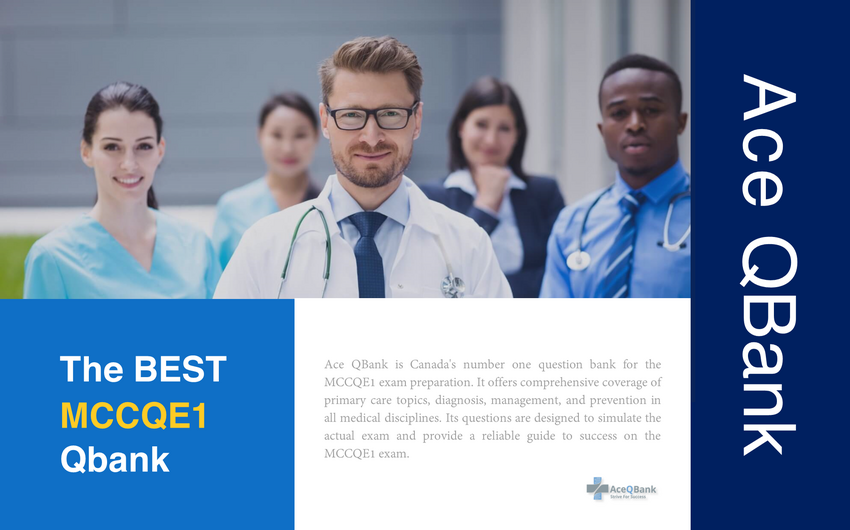
Reference:
The Qbank provides resources for further study and also highlights the corresponding objective with the question. This helps you to track your progress and increase your chances of success in the exam.
Studying for the Canadian qualification exam can prove to be quite a challenge. To help applicants succeed, the Ace QBank team works diligently to provide the most up-to-date information available. The team is committed to providing the highest quality of materials, allowing applicants to be as prepared as possible and ensuring each applicant has the best probability of passing the exam.
The Canadian physicians behind this platform have a deep and genuine passion for helping other physicians. This passion is evident in the high-quality clinical vignettes, summary tables, and custom illustrations they have created. These resources are not only comprehensive and informative but they are also designed to simplify even the most sophisticated medical concepts.
At Ace QBank, we understand the importance of providing comprehensive and reliable resources for those looking to pass the MCCQE1 exam. We are proud to offer a comprehensive question bank backed by experts dedicated to advancing health through superior education. With our resources and materials, you can be sure that you are getting the best chance of success when it comes to your MCCQE1 exam preparation.
Overall, the user-friendly platform and quality of content put Ace QBank above the rest and make it a must-have for anyone looking to ace the exam. With Ace Qbank, you can be sure you are getting the best preparation for the MCCQE Part 1.
What Does Ace QBank Offer For MCCQE1 Exam Preparation?
The Ace QBank is an invaluable resource for medical students and professionals preparing for the Canadian Qualification exam. With three distinctive products that are designed to facilitate the preparation for the exam and a comprehensive range of features, Ace QBank provides an unparalleled advantage when preparing for the MCCQE1.
The Qbank offers high-quality questions crafted by experts who have a deep understanding of what is tested in various examinations. These questions are guaranteed to provide comprehensive coverage of the MCC objectives, so you can be sure you are investing your time in studying the right topics.
We have discussed the Qbank main products and briefly covered the features of Qbank. Let’s explore these features in more detail here:
Flexible Interface:
The question bank has a user-friendly interface that makes it easy to create question blocks tailored to your needs. Whether studying for a single discipline or multiple disciplines, you can easily create question blocks specific to the topics you need to cover. This makes it much easier to focus on the areas you need to study for and avoid wasting time on topics that are not relevant to your studies.
Creating a realistic study plan is essential for success when preparing for the MCCQE1 exam. The Qbank interface can be used to generate custom question blocks tailored to your individual study schedule. This allows you to make the most of your time and ensures that you are well-prepared for the exam. By utilizing the Qbank interface, you can practice the questions that are most relevant to the topics you need to review. This will assist you in concentrating on the areas in which you require the most improvement and will also help you in becoming more prepared for the examination.
It’s an efficient way to maximize your time and ensure that you’re adequately prepared for the exam.
High-Yield Questions:
The Qbank has over 2,400 high-yield questions that are designed based on MCC objectives. This will allow you to cover and practice the MCC objectives comprehensively and intuitively, giving you the upper hand on exam day.
But it doesn’t end there—the Qbank also provides detailed explanations of all options for each and every one of these questions so that you understand why the correct answer is the one given and how to apply the same thought process to future problem-solving.
With the Qbank, you can be sure that you have a comprehensive understanding of the material covered in the exam rather than relying solely on memorization.
Study Modes:
You have two helpful study modes to choose from: Tutor and Time Mode.
Time Mode can help you learn how to manage your time better and give you a solid strategy for taking the exam. If you’re looking to improve your test-taking strategy and time management skills, the Time mode of studying is the way to go. It’s great for disciplines you already understand and makes working through the material at a steady pace easier.
On the other hand, Tutor Mode is perfect for more challenging disciplines that require a bit more of your attention. It gives you a more relaxed approach to studying; you can take your time and go over the material at a slower pace, allowing you to really take in the information and understand medical concepts better. This way, you can get a better grasp of the objectives and feel more confident when it comes to taking a test.
Medical Council of Canada Objectives:
Question banks provide a comprehensive set of questions that cover the objectives tested on the MCCQE part 1, allowing users to become comfortable and confident with the types of questions they are likely to encounter during the exam.
It’s like a personalized study guide, helping ensure that users are properly covering all the objectives that are likely to be tested and understand the medical concepts.
However, the multiple-choice questions are not the only content designed based on the MCC objectives; the CDM part’s clinical cases are also designed based on the MCC objectives to ensure that candidates are given the opportunity to properly prepare and have the best chance of success.
Clinical Cases:
Top-notch clinical cases are designed to assist in the success of the exam. These cases are created to provide a comprehensive understanding of the objectives set forth by the Medical Council of Canada and also simulate the Clinical Decision-Making component, which is an integral part of the exam.
Candidates can gain a thorough understanding of diagnostic criteria and management steps in order to tackle the Clinical Decision Making (CDM) component. All of the cases are based on the MCC objectives, providing candidates with the perfect framework for learning. Explanations are provided to ensure that they can make the most of the cases and tackle clinical cases confidently.
The questions of clinical cases fall into two categories in CDM Part:
- Short answer Menu
- Writ-in
Ace QBank provides comprehensive exam preparation for those preparing to take a test. Qbank covers both short answer menus and write-in questions to help applicants become familiar with both formats of questions. This ensures that on exam day, applicants will be well-equipped to handle either type of question they may encounter.
The MCCQE Part 1 has a major emphasis on Clinical Decision Making (CDM), and it is essential to be properly prepared. To ensure success on this exam, ensure you have gone through all the objectives and practiced answering clinical cases in the question bank. This will give you ample preparation so that when it comes time to answer, you can be confident in your abilities and continue on with success.
MCCQE1 self-assessment:
The self-assessment questions have been hand-picked carefully to ensure that you get an accurate gauge of your understanding of the objectives covered in the MCCQE Part I exam. Each assessment question is unique compared to the ones available within the question bank, allowing you to test your knowledge of the material and understand how you will perform on the exam. This will give you a significant advantage in your preparation, saving you time and energy while also giving you more insight into your preparation for the exam and the opportunity to turn your weakness into strengths before sitting for the exam.
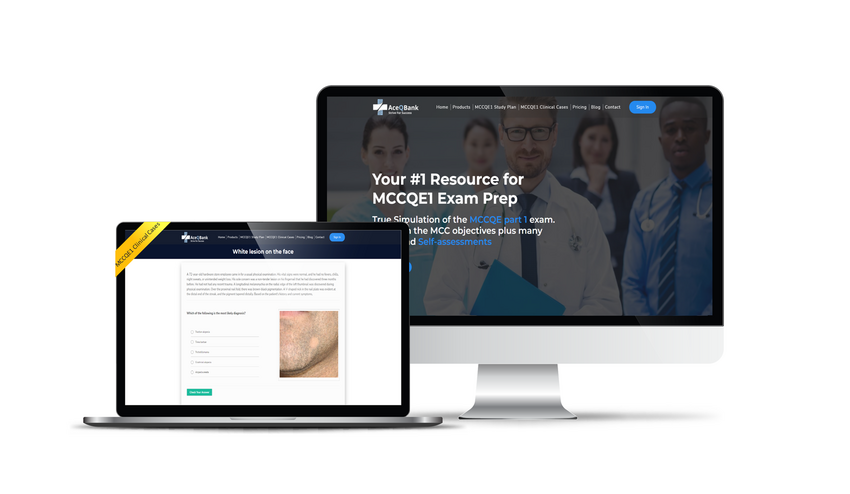
Summary points:
A summary point provides a concise and easy way to review key concepts quickly and efficiently. By using easily digestible key points, these summaries provide a quick and effective way to gain insight into the subject matter without having to read through an explanation and quickly review the key concepts in a matter of minutes. This is especially useful for last-minute reviews of challenging topics.
Summary table and flow charts:
Summary tables are an incredibly useful tool to effectively summarize the most important information in a clear and concise manner. They provide an overview of all the essential details in an organized and concise manner, making it easier to remember the key points. Summary tables are especially useful for comparing and contrasting different medical concepts, as they clearly highlight their resemblances and differences. By providing a comprehensive overview of the data, summary tables can help you recall essential details, make better decisions and select the correct answer.
On the other hand, a flow chart provides a panoramic view of the diagnostic criteria and management steps, allowing you to quickly and easily identify what they need to know. This clarity is invaluable, as it allows you to confidently approach specific tricky questions and avoid any potential pitfalls that could cost you a score.
Furthermore, by mapping out the diagnostic criteria and management steps, a flow chart allows you to see the big picture and make connections between different objectives, helping you understand the material better.
Flow charts are a powerful tool that can assist in simplifying complex processes, depict linkages, and highlight the most appropriate action to take next. They are a very useful resource for comprehending the structure of thoughts and arranging information in a manner that is correct.
Reference:
When it comes to referencing in an academic setting, it is only used to show the sources used to provide the content. However, at the Ace QBank, it serves two purposes. Firstly, it provides you with resources for further study so you can expand your knowledge and understanding of the topic. Secondly, it highlights the corresponding objective associated with the question, so you can track your progress. This way, you can see which objectives you have mastered and which ones you need to focus on. Therefore, at the end of each question within the reference section, you will find the reference and corresponding MCC objectives.
Update Content:
Ace QBank has implemented two active update systems for its question bank to ensure that the content remains up-to-date and reliable for MCCQE1 exam preparation. The two systems are regularly monitored and updated with the latest Canadian guidelines and recommendations. This ensures that the question bank is always accurate, comprehensive, and up-to-date.
One update system monitors the question pool and eliminates outdated questions that are no longer valid, which further improves the accuracy of the Qbank. Other systems add relevant new questions to the Qbank, keeping it up to date.
The combination of these two systems ensures that the Qbank remains up-to-date and reliable at all times, providing you with only the most current and accurate questions to help you succeed in your exams.
The Qbank provides a comprehensive and detailed overview of the Medical Council of Canada’s objectives, allowing you to focus on the areas you need to improve and master. With the Qbank, you can save time and energy by quickly identifying and honing in on the topics you need to focus on.
Additionally, the Qbank provides a broad variety of high-yield questions along with in-depth explanations for each answer, allowing you to identify and correct any mistakes you may have made.
This helps you to understand the material better and increase your chances of passing the exam. All these advantages make the Qbank an absolutely ideal tool for preparing for the MCCQE part 1 exam and help you master the MCC objectives, save time, and increase your chances of passing the exam.

MCCQE1 Preparation Course
The exam is a comprehensive and intense exam. Although a preparation course is not necessary to pass the exam, some candidates may benefit from a rapid review of high-yield medical concepts. Such a comprehensive review can help to identify and solidify areas of strength and weakness.
Candidates also may benefit from the guidance of an experienced tutor who can help them to better prepare for and understand the material, and such a short course can provide the candidates with additional confidence and motivation for the exam.
However, the first thing you should do when deciding on an MCCQE1 review course is to decide whether the course will be worth it for you in terms of time and money spent. If this is your first time taking the MCCQE1 prep course or if this class has been recommended by someone else who took their own test, then it might be a good idea to take it at least once before deciding whether to take it or not it’s worthwhile for future exams as well.
Books For MCCQE1 Exam Preparation
When it comes to selecting the right textbook for the qualification exam, there is a lot to consider. With so many books available, it is not always easy to determine which one is the most appropriate for your needs. The right textbook should provide insight into complex medical concepts and essential key points related to the concepts, helping to facilitate coverage of the MCC objectives.
The textbook should also provide an easy-to-follow format so that you can quickly and easily understand the material. The textbook should also be comprehensive, providing detailed information on all the topics covered in the MCC objectives as well as up-to-date so that you are studying the most current information available.
It is prepared to use Canadian textbooks for studying that contain the most current guidelines, recommendations, and protocols used in Canada. This ensures that those taking the exam are equipped with the knowledge required to meet the high standards expected in the medical field. The textbooks provide a comprehensive overview of the material, helping to ensure that all aspects of the exam are properly covered.

Proven Tips & Strategies For Acing The MCCQE1 Exam
The MCCQE1 is a standard computerized exam that assesses medical graduates’ problem-solving and clinical thinking skills. It is a challenging exam that requires a good understanding of MCC objectives, an effective test-taking strategy, and good time management.
This is true for both sections of the MCCQE part 1 exam, despite some claims to the contrary that the Clinical Decision Making (CDM) section is the more difficult one. Regardless, it is important to understand that knowledge alone is not enough to pass the exam; a good test-taking strategy and the ability to manage time efficiently are also key components to success.
International Medical Graduates (IMGs) are finding it increasingly difficult to pass the qualifying exams required for medical licensure in North America. Factors contributing to this difficulty include a decrease in the number of positions available for IMGs, a lack of preparation for the exams, and unfamiliarity with exam format hindering test performance.
IMGs face obstacles from the start of the process, such as a lack of access to standardized testing materials and limited resources in the form of mentors and study groups. The exams are rigorous, testing knowledge and competency in various medical topics, and are often unfamiliar to IMGs.
Test-taking strategies and time management play a key role in the exam, and developing good test-taking strategies is another challenge IMGs face that must be addressed. This often includes familiarizing oneself with the exam structure, content outline, and timing.
However, International Medical Graduates (IMGs) underestimate the MCCQE1 exam and often rely heavily on non-Canadian resources to prepare for the exam, which ultimately results in them not being adequately prepared. These are major contributors to the difficulty of this exam for IMGs.
Let us go over the strategies that medical graduates can employ to overcome the challenges of the qualification exam one by one:
Avoid Using Foreign Resources:
There are several differences between the USMLE steps and the MCCQE1, but the most notable one is that the USMLE is the examination all physicians must pass in order to practice medicine in the United States. In order to be qualified to take the exam, you must have graduated from an accredited medical school. The MCCQE1, on the other hand, is only open to those who have a Canadian permanent resident (PR) card or citizenship.
The USMLE and MCCQE1 are two different exams that are used to assess a physician’s knowledge and competency. The USMLE is a three-step board exam that assesses a physician’s fundamental medical knowledge, comprehension of medical concepts and principles, and ability to apply that knowledge in the practice of medicine using a stepwise approach.
The MCCQE1, on the other hand, is a one-time exam that is clinically oriented and used to evaluate the ability to apply knowledge and competency of candidates based on the MCC objectives that are aligned with CanMEDS roles for medical licensure. It is designed to evaluate the competency of medical graduates and to ensure that they have the knowledge and skills required to practice medicine safely and effectively.
When it comes to the MCCQE1 and the USMLE, there are some similarities in the content covered. Both exams focus on the same core medical knowledge and require a mastery of the same topics. However, the major difference between the two qualification exams lies not in the metric system but in the healthcare system priorities, preventive medicine, and certain ethical aspects.
As such, using American resources for the MCCQE1 exam preparation might focus on certain topics that are not as high-yield for the exam. This is because the MCCQE1 emphasizes the Canadian healthcare system, guidelines and recommendations, preventive medicine, and ethical considerations, which may not be as heavily tested on the USMLE.
Therefore, it is important for IMGs preparing for the MCCQE Part 1 to be aware of these differences and to use Canadian resources to prepare for the exam. Doing so will ensure that they are adequately prepared for the exam and have the best chance of success.
Improve Your Time Management:
On exam day, the clock can be your toughest opponent. With time slipping away from you, it can be easy to feel overwhelmed and frustrated. This can easily trigger the fight or flight response, and the fear of failure can start to creep in. For some, this fear can even develop into a full-blown panic attack.
You may have heard or read this common advice: “If you find yourself running out of time, take a few deep breaths, focus on the task at hand, and stay positive. It is very easy to let negative thoughts take over in these situations, but doing so will only hinder your performance”.
The MCCQE1 exam questions are not yes-or-no questions. There are clinically oriented questions, which means engaging, and candidates will interact with every question to solve the presented clinical problem.
Here is the thing, being on top of your game, knowing how long the interaction should last and when it is time to move, is the golden key to success.
Contrary to IMGs, this might be easier for Canadian medical graduates, as they may have encountered engaging questions tuned to evaluate their knowledge as medical students.
Nevertheless, managing your time on a test is critical to ensuring success. Practicing this skill ahead of time is the best way to prepare. By doing so, you can become comfortable with reading and analyzing the question stem and associated options quickly and accurately, eliminating the incorrect answers to ultimately select the right answer.
Therefore, it is important to practice managing your time so that you can complete the exam in the allotted time. Doing questions in timed mode and getting more comfortable with the time constraints of the exam can facilitate the development of skills needed to manage your time effectively.
Without the necessary practice, you may find yourself feeling overwhelmed and unprepared during the test. So, consistently practicing and assessing your own time management skills is the only way to identify areas that need improvement.
You will be able to achieve your goal, reduce the amount of stress caused by the examination, and raise the number of questions that are answered in the allotted amount of time if you have a clear understanding of how to manage your own time.
Time management is an acquired skill and improved with practice and dedication, allowing for greater efficiency and effectiveness on the challenging MCCQE1 exam. So, lack of practice will lead to worse management of time on the exam and ruin the opportunity for success.
Develop Test-Taking Strategy:
The Medical Council of Canada exam is arguably one of the most difficult exams that you will take as a healthcare professional. Having a deep understanding of MCC objectives is a fundamental part of being successful in the MCCQE Part 1. However, having the ability to apply this knowledge in a timely manner during the exam is equally, if not more, important.
Exams such as the MCCQE Part 1 require a well-thought-out strategy to ensure that all 210 questions are answered in the allotted time. This strategy should incorporate understanding and application of knowledge, time management, prioritization of questions, and understanding of the exam format.
On the other hand, there is no one-size-fits-all solution for test-taking strategies, practice and dedication are key to developing the most effective strategies. You have to take the time to develop and practice test-taking strategies that are tailored to your learning needs. The theory does not work; candidates need to practice test-taking strategies in order to determine the most effective ones for their particular situation.
Test-taking can be a daunting endeavour, but having a test-taking strategy that works can make the process much more manageable. Here are a few tips that can be extremely beneficial:
- Budgeting your time can help you focus on the most important questions without running out of time, and you can use flags to mark the ambiguous questions so you can return to them instead of reading them repeatedly.
- Understanding the type of questions you are being asked can enable you to better utilize the available time- particularly in the CDM part of the exam, where you have to follow the specific instruction provided at the end of clinical case questions.
- Breaking down long questions into more manageable parts can help you better grasp the material- by reading the first 2 lines and the last line of the question stem.
Ultimately, these are only a few examples of excellent test-taking strategies that significantly improve performance; all it takes is practice to put the strategies into practice. So you are more comfortable using them during the exam; nevertheless, by employing one or more of these strategies, you can perform better on tests and feel more confident.
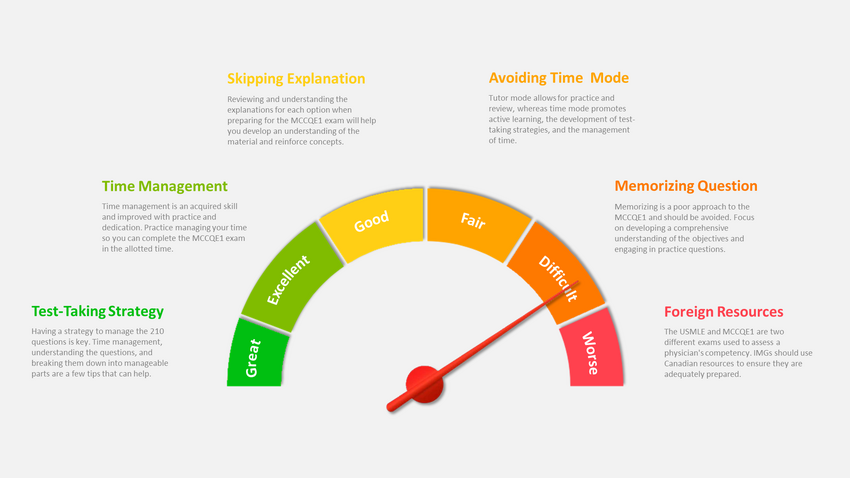
Use Time Mode To Your Advantage:
The question bank offers two study modes, tutor and time mode. Tutor mode allows users to practice questions without any time limit; it is great for drilling certain topics, particularly those you are having difficulty grasping. It allows you to go back and review questions that you got wrong, as well as to understand why you got them wrong.
On the other hand, time mode helps users to practice questions under time pressure. Doing questions in time mode will enhance active learning and help the user develop test-taking strategies and time-management skills. It provides a set time limit to answer questions, rewards users for completing them quickly and accurately, and encourages users to think quickly, pay attention to detail, and develop strategies for dealing with time pressure.
Using the Qbank solely in tutor mode can reduce its effectiveness because it eliminates most of the benefits of the test-taking strategy and time management and dilutes the effect of active learning. You are essentially training yourself to think and work in a way that does not simulate what you will encounter on the actual exam. This can damage your test performance and prevent you from reaching your full potential.
The time mode forces you to work at a faster pace and forces you to develop and apply strategies for test-taking and time-management skills. It also helps you to identify areas you need to study more thoroughly and increase your speed, accuracy, and confidence when answering questions in a limited time frame.
When it comes to studying for your exams, balancing both the tutor and time modes is important. Give yourself enough time to become comfortable with the material, but also challenge yourself with the time mode by setting a timer and focusing on completing questions in a limited amount of time. By doing this, you will become more adept at problem-solving and will be able to apply the skills you gain to the actual test.
Avoid Skipping The Explanation
Understanding the explanations for each option and the questions that have been answered wrong cannot be overstated, When it comes to preparing for the MCCQE1 exam. This is because the explanations are essential for developing a deeper understanding of the objective and for avoiding the same mistakes in the future.
You can review and practice the material more effectively by understanding what went wrong. That way, you can ensure that you are ready for the test and adequately prepared for the topics that will be tested.
It is important to remember that reviewing the explanations for questions answered correctly is just as important as reviewing those answered incorrectly. It is easy to overlook this step, but doing so will reinforce the concepts, and it is possible to pick up on new information from the explanations.
In short, understand the explanations for each option while preparing for the exam; it’s essential to take the time to go over them carefully. Without understanding these explanations, you are more likely to make the same mistake again and have a greater chance of failing the exam.
Spend time studying the explanations and actively think about why a particular answer is correct or incorrect. Taking the time to analyze each question and answer can help deepen understanding and improve long-term memory, thus enhancing retention and increasing the chance of succeeding on your exam.
Do Not Memorize Questions:
Memorizing is a common strategy for studying for exams, but it is the worst thing you could do when it comes to the MCCQE Part 1. This exam is clinically oriented and requires a comprehensive understanding of the MCC objectives to solve the problems presented in clinical vignettes.
Simply memorizing the questions without understanding the underlying medical concepts and associated objectives is not an appropriate approach to this exam and significantly reduces the chance of passing the exam. The goal of the MCCQE1 is to evaluate a candidate’s ability to solve clinical problems using the knowledge they have gained from their medical education.
Studying and understanding the MCC objectives is the best way to prepare for the exam. Make sure to read and understand the objectives thoroughly and practice applying them to various clinical scenarios. It’s also important to practice the clinical vignettes and study the explanation for both correct and incorrect answers. Doing this will help you to be better prepared and reinforce the concepts.
Memorizing is a poor approach to the MCCQE Part 1 and should be avoided. To ensure success, focus on developing a comprehensive understanding of the exam objectives and engaging in practice questions and review sessions. Doing so will help prepare for the exam and provide a valuable foundation for medical practice.
Avoid lingering On The MCC Objectives:
Studying for an exam can be a stressful and overwhelming experience. With so much information to learn, it can be difficult to stay organized and focused. While it is essential to have a thorough understanding of the objectives of the MCC exam, it is equally important to avoid getting into unnecessary details or going beyond the scope of the MCC objectives when studying.
Going into too much detail can be counter-productive, as it takes away valuable time and energy that could be used to focus on other areas. Not to mention, it can lead to burnout and further impair your ability to perform well on the MCC exam. Therefore, it is important to develop a realistic study plan and stick to it. This will help you maintain focus and structure your routine. It is also beneficial to build question blocks according to your study schedule. This will provide an opportunity to practice and identify any weaknesses in your knowledge.
Cover All Disciplines:
One way to increase your chances of success is to make sure you’re well-rounded in all disciplines. Of course, you can’t cover everything in a single sitting. So focus on the areas you’re weakest in and make a study plan that will help you better prepare for the exam.
The exam has two independent parts; therefore, you may encounter a few questions among the MCQs and a couple among the CDM cases from disciplines that you never studied for the exam, which could cost you many points. Therefore, it is important to be prepared for all disciplines and not underestimate any of them.
By covering all disciplines, you’ll be better prepared for any question that comes your way.
Review:
Effective revision is of the utmost importance when preparing for the MCCQE1 exam. Developing a personalized revision plan that works with your unique learning style and capabilities can help you to maximize your chances of passing the exam.
When creating a revision plan, you should commit to regularly reviewing a certain amount of material, regardless of your progress. So how much should you review? That depends on the material and how well you know it. If you’re struggling with the material, you might want to review it more often. But as a general rule, you should review the material at least once a week to keep up with your studies.
Additionally, it is essential to maintain a consistent approach to revision to ensure that you are strengthening your long-term memory and preparing your mind for the exam. This will make it easier to answer questions quickly and accurately, which is vital for good time management during the MCCQE1 exam.
Key Takeaways:
You need a good question bank to study for the exam; the best of the best. There are a lot of Qbanks out there, but not all are created equal. Some are better than others, and some are simply not worth your time. Ace Qbank is the best option available in Canada when it comes to preparing for the MCCQE1 exam.
The question bank can be a powerful tool to help you prepare for your exams. Using it effectively can improve your test-taking strategy, time management and knowledge. With proper preparation, you can pass your exam with a high score on the first try.
Ace QBank questions and clinical cases are designed based on the MCC objectives, and explanations are in-depth, concise and evidence-based medicine. Canadian physicians created the Ace QBank for Canadian physicians. If you want to pass the MCCQE1 exam, then investing in the Ace Question Bank is your best decision.


